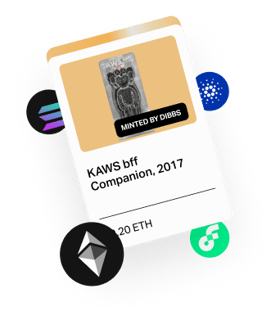Redeemable Digital Collectibles: Challenges and Solutions
Discover how brands can navigate the challenges of creating redeemable digital collectibles and provide a seamless experience for customers.

Redeemable digital collectibles open up new opportunities for brands to create better consumer experiences and improve customer lifetime value and retention rates.
However, the path of creating redeemable digital collectibles is riddled with various obstacles. And businesses must take a proactive approach towards overcoming them so they can stay ahead of the curve.
In this article, we’ll explore some challenges brands encounter while launching redeemable digital collectibles and solutions to help overcome them.
Subscribe to get our best content in your inbox
By clicking “Submit” you agree to Dibbs
Privacy Policy and
consent to Dibbs using your contact data for newsletter purposes.

Challenges Brands Face with Redeemable Digital Collectibles
Here are the various challenges that brands face when venturing into the realm of redeemable digital collectibles:
Logistic Challenges
One of the most pressing logistical challenges in offering redeemable collectibles that can be exchanged for physical items is the complexity of shipping, especially when it extends across international borders.
For starters, international shipments incur customs and duties. These add to costs and introduce delays in delivery timelines. Additionally, when the items to be redeemed are fragile, specialized packaging and handling are required to ensure they arrive in pristine condition. This further complicates the logistics of the redemption process.
But even before tackling these challenges, businesses need to collect and verify shipping addresses. This is difficult as users are hesitant to share personal information due to the fear of doxing.
Redemption Hurdles
When it comes to the redemption process, the terminology alone—smart contracts, gas fees, public and private keys—can deter users. To top that, users may also have to set up a wallet to obtain their collectibles. This can further add to the complexity.
User interface (UI) issues present another set of challenges. Even if a user is technically savvy, a confusing interface can lead to mistakes, frustration, and ultimately, abandonment of the redemption process.
Item Storage and Security
Physical items tied to redeemable digital collectibles require storage facilities or warehouses, as users may not immediately redeem their items. These expenses may add up over time, especially for items that remain unclaimed for extended periods.
Additionally, certain items, such as fine wines, demand specific environmental conditions for proper preservation. Failure to meet these conditions can compromise the quality of the item, create poor experiences, and erode trust in the brand.
Regulatory and Legal Complexities
While creating collectibles tied to experiences or digital assets has fewer regulations, those linked with age-restricted or regulated goods like alcoholic beverages grapple with several legal requirements.
For example, if a collectible can be redeemed for a bottle of wine, the brand must have mechanisms in place to verify the age and location of the redeemer, in compliance with local and federal laws.
Failure to adhere to these regulatory requirements at each step of the NFT creation and redemption process can expose brands to legal risks, including fines and other penalties.
3 Ways Brands Can Solve the Challenges Associated with Redeemable Digital Collectibles
Let's look at how brands can overcome the challenges associated with redeemable digital collectibles and successfully launch their collection.
Ease Redemption Processes
To enhance the user experience and streamline the obtaining and redemption process of digital collectibles, brands can adopt several strategic approaches:
- Wallet integration: Embed digital wallets into the platform to eliminate external setup.
- In-app tutorials: Offer step-by-step guides within the app to help users navigate the redemption process.
- Progress alerts: Send notifications at key milestones to keep users engaged and informed.
- Secure forms: Use secure, easy-to-fill forms for collecting shipping details and verifying IDs during redemption.
- FAQ section: Include a comprehensive FAQ section to preemptively address common questions and issues.
- One-click redemption: Implement a one-click option for users who have already verified their details to speed up redemption.
- Batch processing: Allow users to redeem multiple collectibles at once to streamline the process for those with multiple collectibles.
Consult Legal Counsel
Consulting with experienced legal professionals is crucial when creating digital collectibles, especially those tied to physical items or regulated goods. Here's why:
- Risk mitigation: Proactive legal counsel can identify potential pitfalls and liabilities, helping brands to avoid costly mistakes or legal repercussions. This is particularly important for items that are age-restricted or subject to other regulations, such as alcoholic beverages.
- Legal framework development: A specialized legal team can develop clear and robust legal frameworks tailored to the brand's specific industry and type of digital collectible. This ensures that all aspects of the creation, distribution, and redemption processes are legally sound.
- Adaptability: Regulations around digital collectibles are still evolving. Legal professionals can help brands adapt their strategies to stay compliant with changing laws, thereby future-proofing the business.
Partner with Tokenization Platforms
Partnering with Tokenization-as-a-Service (TaaS) platforms offer multiple advantages to brands in streamlining the redemption process for digital collectibles:
- Identity verification: TaaS platforms often come with built-in identity verification systems, including Know Your Customer (KYC) and Anti-Money Laundering (AML) checks. This ensures secure and compliant user onboarding.
- Expertise in regulatory matters: With in-house experts on legal and regulatory compliance, these platforms can guide brands through the complexities of creating and managing redeemable digital collectibles.
- Physical asset storage: TaaS platforms like Dibbs offer secure storage vaults and handle the logistics of shipping physical items when they are redeemed, streamlining the end-to-end process.
- Scalability: TaaS platforms are designed to scale, allowing brands to easily expand their digital collectible offerings without worrying about growing pains in logistics or compliance.
How Dibbs Helps You Tackle Redeemable Collectible Challenges
While redeemable collectibles offer a plethora of exciting possibilities, they come with inherent challenges, including logistical complexities, security concerns, and legal compliance issues.
As a frontrunner in the tokenization-as-a-service sector, Dibbs provides an all-encompassing solution that covers the entire spectrum from tokenizing your brand's offerings to ensuring secure storage and prompt delivery of physical items.
We also provide a positive redemption experience for customers and our team of experts will ensure that all collectibles are legally compliant. To learn more about how Dibbs can help your brand integrate redeemable collectibles into your strategy, schedule a demo with us today.

